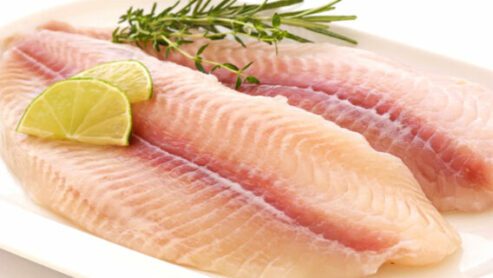When it comes to seafood choices, Basa fish is a name that often pops up in discussions about healthy eating. This mild-flavored, white-fleshed fish has gained popularity in recent years, but is it truly a healthy food option?

In this article, we will dive deep into the world of Basa fish to uncover its nutritional profile, potential concerns about its farming, and the health benefits it can offer.
By the end of this article, you’ll have a clear understanding of whether Basa fish deserves a place on your dinner plate.
What Is Basa Fish?
Basa fish, or Pangasius court, is a species of catfish native to the Mekong River Delta regions of Vietnam and Cambodia. It is an omnivorous freshwater fish that can grow up to 3 feet long and weigh 110 lbs.
Basa is a tender, mild-flavored fish with large flaked meat and a fine texture when cooked. Its white flesh has very little natural fishy odor and takes on the flavors of sauces or seasonings very well.
In Vietnam and other parts of Asia, basa is a popular table fish eaten steamed and grilled in soups and curries. But most of the basa exported globally comes from fish farms rather than wild-caught sources. Vietnam is the largest exporter of basa fish.
Basa fillets are increasingly replacing white fish fillets like cod, haddock, and grouper in restaurants and frozen prepared foods in North America. They are an inexpensive option compared to other white fish.
Nutrition Facts For Basa Fish:
| Nutrient | Amount |
|---|---|
| Calories | 105 |
| Protein | 18g |
| Total Fat | 2.4g |
| Saturated Fat | 0.7g |
| Cholesterol | 39mg |
| Omega-3 Fatty Acids | 200-300mg |
| Vitamin D | 25 IU |
| Vitamin B12 | 1.2mcg |
| Selenium | 18.4mcg |
Potential Concerns About Basa Fish Farming
Most frozen basa fillets exported globally come from large-scale aquaculture or fish farm facilities in Vietnam and China rather than wild fisheries.
This intensely farmed production has raised some environmental and ethical concerns, including:
- Antibiotics and chemicals – Some basa farms use antibiotics and disinfecting chemicals to control disease. Antibiotic use can lead to drug-resistant bacteria.
- Polluted waters – Basa fish farms are often located along the Mekong River and other waterways affected by agricultural and industrial pollution. This can negatively impact water quality and wild fish populations.
- Fish waste – High-density fish farms create a lot of concentrated waste, which can spread parasites and diseases between fish and pollute waterways if not properly treated.
- Escapes – Farmed basa fish sometimes escape and can spread disease or compete with wild fish populations.
- Unsafe working conditions – Some concerns about working conditions for employees at unregulated basa fish farms have been raised.
When purchasing farmed basa, look for brands that say their fish is raised sustainably and responsibly without antibiotics. Or opt for wild-caught basa or other whitefish varieties.
People Who Eat Fish May Live Longer
Numerous studies have found that eating fish regularly, about 1-2 servings per week, is associated with a lower risk of chronic disease and a longer lifespan.
For example, a large research review published in the Journal of Internal Medicine looked at 22 previous studies involving over 400,000 participants. They found that people who ate more fish had a lower mortality risk from any cause during the study periods.
One serving (3.5 ounces) of fish per week was associated with a 7% lower risk of dying over the study duration, while two servings per week corresponded to a 14% reduced risk. Increased lifelong fish consumption seems to have the greatest benefits for longevity.
The nutrients and omega-3 fatty acids in fish like basa may help protect against heart disease, neurodegenerative disease, diabetes, and inflammation. These protective effects could contribute to a longer lifespan.
Of course, lifestyle habits like regular exercise and not smoking are also key. But adding fish like basa to your diet 1-2 times per week could do great things for your long-term health.
May Lower Your Risk of Heart Disease
Eating fish has consistently been linked to a reduced risk of heart disease, the leading cause of death worldwide.
The omega-3 fatty acids in fish have strong anti-inflammatory effects that protect blood vessels and heart tissue. They also help manage triglyceride levels and blood pressure.
According to a research review from Harvard Medical School, eating 1-2 servings of fatty fish per week reduces the likelihood of dying from heart disease by 36%. Omega-3-rich fish was shown to be more beneficial than supplements.
Basa fish is not as high in omega-3s as fatty fish like salmon or trout. But a 3.5 ounce serving still contains over 100% of the recommended daily intake.
Enjoying basa fish once or twice a week can lower inflammation and provide cardiac benefits. Pair it with other heart-healthy foods like vegetables, whole grains, legumes, and healthy oils.
Health Benefits of Basa Fish
Here is a summary of some of the top health benefits associated with eating basa fish:
- High protein – Basa contains over 40% of the Daily protein value in a serving. Protein helps maintain muscle mass and promotes fullness.
- Omega-3 fatty acids – Provides anti-inflammatory omega-3s that support brain, eye, and heart health.
- Selenium – An important antioxidant mineral that boosts immunity and thyroid hormones.
- Vitamin B12 – Needed for energy production and red blood cell formation. Basa helps prevent B12 deficiency.
- Potassium – Helps lower blood pressure and counterbalances sodium. Most people don’t get enough potassium.
- Low mercury has deficient mercury levels, making it safer for pregnancy and young children.
Overall, basa fish provides a nutritious protein option that is low in calories, high in protein, packed with omega-3s, and contains several essential vitamins and minerals. Adding it to your diet provides anti-inflammatory effects and supports whole-body wellness.
Is It Safe to Eat?
Basa fish from reputable sellers that follow food safety guidelines is considered safe to eat. Here are some things to know regarding the safety of basa fish:
- Low mercury – Basa has deficient mercury levels, making it safer than high-mercury fish like tuna. However, some chemicals may be used in basa farming.
- Import regulations – Imported basa must meet the same FDA and USDA safety regulations as domestic seafood.
- Proper storage – Ensure basa is kept at a constant freezing temperature if buying frozen. Use fresh basa within two days.
- Cook thoroughly – Cook to an internal temperature of 145°F. This kills any potential parasites, viruses, or bacteria.
- Buy from reputable sellers – Purchase basa from sellers that follow food safety standards to reduce risks.
- Avoid high-risk groups – Young children, pregnant women, and those with compromised immunity should avoid raw or undercooked basa.
Following basic food safety practices when handling, cooking, and consuming basa fish can reduce risks and make it safe to enjoy as part of a healthy diet. Those with higher risk factors may want to avoid raw or undercooked basa.

Conclusion:
Basa is a mild, affordable white fish that is growing in popularity. It provides an excellent source of lean protein, omega-3 fatty acids, selenium, B12, and other nutrients.
Eating farmed basa in moderation, 1-2 servings per week, can provide health benefits like reduced inflammation, heart health protection, and longevity.
While there are some environmental concerns with basa fish farming, purchasing from reputable sustainable sources and following proper handling can reduce risks. Basa from a trusted seller is safe to eat when cooked thoroughly.
Overall, basa fish can be part of a healthy, balanced diet for most people when consumed in recommended amounts. Its light flavor and flaky texture make basa an excellent choice for seafood lovers looking for an affordable and nutritious fish option.
Is basa fish high in fat?
The answer to this question is no! Basa fish contains a healthy ratio of fat-to-protein. Many oily fishes contain high concentrations of unhealthy fats, such as salmon and tuna, which have up to 24 grams of total fat per 100 grams, whereas Basa has only three (three). The main reason why most people don’t eat it is that they believe the meat is tasteless or too rigid. You need to know how best to prepare it for its flavour attributes to come out. For example, there’s plenty you can do with basil leaves and limes if you want something light but still flavourful.
Does fish have more protein than chicken?
Basa fish is a type of freshwater, catfish-like freshwater fish that’s found in both the Amazon River Basin and Southeast Asia. Is Basa fish healthy food? Being low on fat, high in protein, and rich with omega fatty acids— it may just be! Basa fillets are typically white to light pinkish-white in colour and have a mild, almost sweet flavour.
Is basa fish good or bad for health?
It is not specified or detailed how the fish are prepared in Uttar Pradesh, India. In addition, there is also no information on what people consume types of fish. However, a consensus from research articles points to consuming some Basa fish as good for health.
Basa fish is a white flesh fish that belongs to the family Pangasiidae. In the Philippines, it is more commonly known as lapu-lapu, as per references from various sources. It is also known in other Asian countries as swai, export white, or just white or striped catfish. This type of fish has been harvested for consumption for centuries. The meat of basa fish has a sweet taste, and its skin can be crispy when cooked.
Is Basa fish safe to eat?
Basa fish (Pangasius court) is generally considered safe to eat. It is a catfish farmed in many countries, including Vietnam, Thailand, and Indonesia. It is a popular seafood choice due to its mild flavour, low cost, and availability.
Like all fish, basa fish may contain trace amounts of environmental pollutants such as mercury and PCBs, which can accumulate in the fish’s fatty tissues. However, according to the U.S. Food and Drug Administration (FDA), the levels of these contaminants in basa fish are generally low and do not pose a health risk to most people.
Additionally, basa fish is a good source of protein and omega-3 fatty acids, linked to various health benefits, including reduced inflammation and improved heart health.
As with any food, handling and cooking basa fish properly is important to prevent the risk of foodborne illness. Ensure to cook it to an internal temperature of 145°F (63°C) and avoid cross-contamination with other foods. If you have concerns about the safety of basa fish or any other food, you should consult a healthcare professional or a registered dietitian.
1 thought on “Is Basa Fish Healthy Food? Unveiling the Facts”